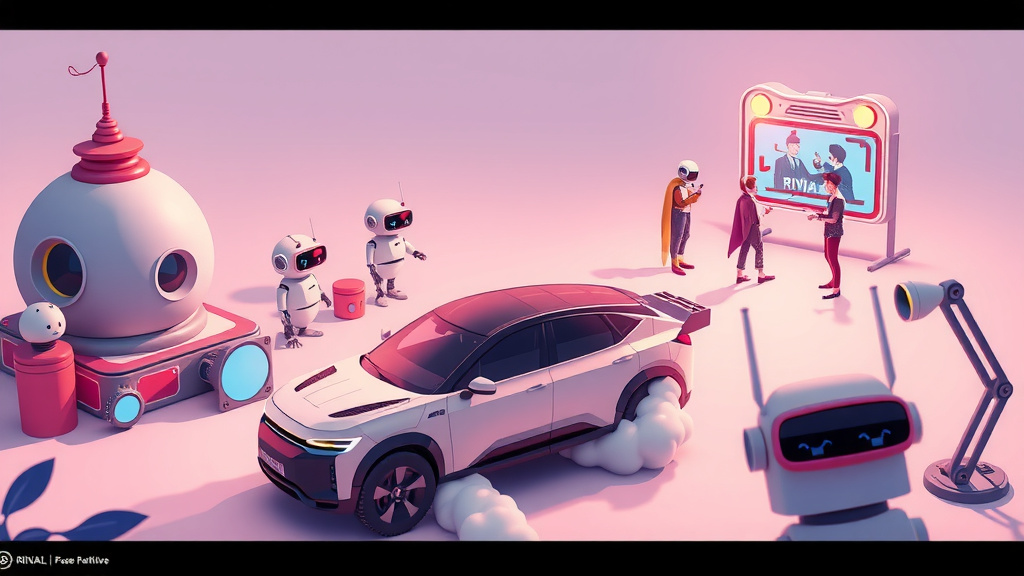The world of artificial intelligence (AI) is rapidly evolving, with significant advancements in AI technology and its applications. In this news brief, we'll explore the latest developments in AI, from the potential of Rivian's AI-driven autonomy to the concerns of creatives about video generation tools like Sora. We'll also examine the impact of AI on the labor market, the strategic advantage of AI for the US, and the latest advancements in AI hardware.
Rivian's AI Potential
Morgan Stanley analyst Adam Jonas has weighed in on Rivian's stock and its AI potential. While Rivian's electric vehicles are well-known, Jonas argues that its true value may lie in its AI-driven autonomy. Rivian's Q4 report showed several positives, including beats on headline metrics and turning gross profit positive for the first time. However, its 2025 delivery outlook suggests a mid-single-digit year-over-year drop in volume, which Jonas considers "appropriately conservative." Rivian also expects an FY25 adjusted EBITDA loss of $1.8 billion, significantly higher than Jonas' previous anticipation.
Sora and Video Generation Tools
OpenAI's video generator, Sora, has hit the UK, sparking concerns among creatives. Sora has the potential to transform the film, TV, and advertising industries, but it also raises questions about copyright and the use of artists' work without permission. The technology is powered by models trained on vast amounts of data culled from the internet, which has led to lawsuits claiming breach of copyright.
AI and the Labor Market
The rapid development of AI is transforming the labor market, with significant shifts in the core skills expected from workers. The World Economic Forum's Future of Jobs Report 2025 highlights that while technological skills will take precedence, AI and big data are expected to be the fastest-growing competencies. To mitigate the negative impacts of AI on the labor market, regulations must be introduced to enhance technology literacy in primary and secondary education, and vocational education must continue to be reinforced, integrating AI-related skills.
AI as a Strategic Advantage
The US must accelerate in the race to mobilize AI for great strategic advantage. President Trump has made the point about American dominance in AI emphatically, and the US government has taken steps to promote American AI, including restricting money from going to the development of certain technologies to "countries of concern." The PRC may claim to have made significant advancements in AI, but the reality is that it will grow and scale technology at any literal or figurative cost.
AI Hardware Advancements
The demand for computing power is increasing as AI models become more advanced. Nvidia's CEO Jensen Huang has offered a glimpse into the fast pace of AI advancement, particularly as programs become better at performing tasks akin to human reasoning. Analysts believe that the news of DeepSeek's launch has urged companies to invest more in AI hardware, positioning Nvidia, Intel, and AMD stocks to cash in on the growth.
Key Takeaways
- Rivian's AI potential may be its true value, but its ongoing losses and lighter delivery guide are an issue.
- Sora and other video generation tools have the potential to transform the film, TV, and advertising industries, but raise concerns about copyright and the use of artists' work without permission.
- The rapid development of AI is transforming the labor market, with significant shifts in the core skills expected from workers.
- The US must accelerate in the race to mobilize AI for great strategic advantage.
- The demand for computing power is increasing as AI models become more advanced, positioning Nvidia, Intel, and AMD stocks to cash in on the growth.
Sources
- Morgan Stanley Weighs In on Rivian Stock and Its AI Potential
- Sora, OpenAI’s video generator, has hit the UK. It’s obvious why creatives are worried
- I was so freaked out by talking to this AI that I had to leave
- Fortifying human capital against artificial intelligence
- Artificial Intelligence Can Be America’s Strategic Advantage
- China Abruptly Replaces Tech Czar Behind AI and Chip Push
- Sergey Brin says AGI is within reach if Googlers work 60-hour weeks
- Amazon Alexa+ — Empowering The Agentic AI Era At Home
- Microsoft Names Suspects in Lawsuit Against AI Hackers
- DeepSeek set off AI hardware ‘arms race’—and Nvidia, Intel, and AMD stocks are positioned to cash in
